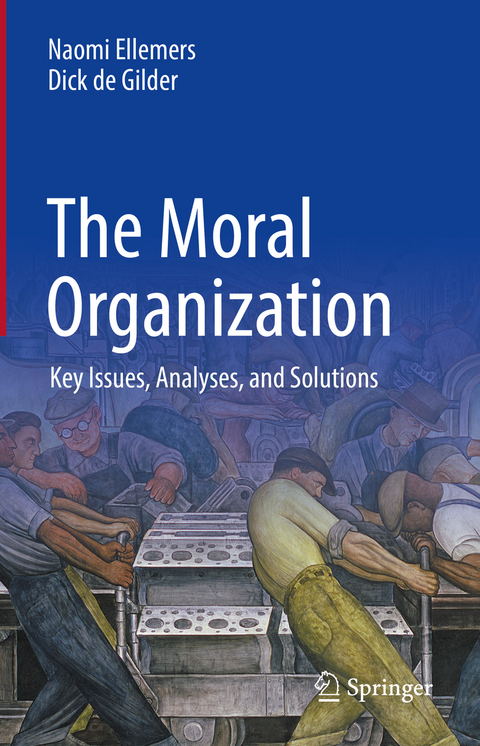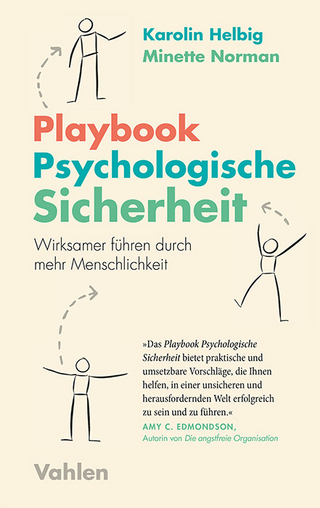
The Moral Organization
Springer International Publishing (Verlag)
978-3-030-84174-4 (ISBN)
Investors, customers and employees increasingly expect organizations to take responsibility for the social impact of their activities. This book applies theory and research on moral psychology and social identity, to offer a new perspective on organizational social responsibility and business ethics. The authors use their unique approach to highlight recurring moral challenges in organizational behavior, such as leadership, work motivation, diversity, organizational change and stakeholder relations. Their analysis explains that people are reluctant to acknowledge and confront moral flaws in their workplace behavior, because this constitutes a source of identity threat. Common strategies to cope with this threat invite justifications and symbolic actions - and prevent moral improvement. Each chapter draws together a wealth of research findings and organizational cases. These not only identify and clarify common moral pitfalls, but also show ways to enhance the likelihood that organizations acquire the knowledge, willingness and ability to build an ethical work climate.
lt;p>Naomi Ellemers is Distinguished University Professor at Utrecht University, and member of the supervisory board of PwC in the Netherlands. With a combination of experimental and applied research methods she examines the behavior of people in groups and organizations. She applies her insights on organizational ethics, compliance, and diversity, in joint projects with regulators, policy makers, and organizational leaders.
Dick de Gilder is Associate Professor of Organizational Sciences at the Vrije Universiteit Amsterdam. Before he was consultant for applied research and innovation at TNO, and senior researcher/consultant at Labor Union CNV. He is an expert on error management in organizations, corporate philanthropy, teamwork and temporary work.
Chapter 1: Moral behavior in organizations.- Chapter 2: Social identity at work.- Chapter 3: Moral leadership.- Chapter 4: Motivating moral choices.- Chapter 5: Diversity and inclusion.- Chapter 6: The human factor in organizational change.- Chapter 7: Relating to stakeholders.- Chapter 8: The power of ethical climates.
| Erscheinungsdatum | 30.04.2022 |
|---|---|
| Zusatzinfo | XI, 345 p. 33 illus., 32 illus. in color. |
| Verlagsort | Cham |
| Sprache | englisch |
| Maße | 155 x 235 mm |
| Gewicht | 697 g |
| Themenwelt | Geisteswissenschaften ► Psychologie ► Arbeits- und Organisationspsychologie |
| Geisteswissenschaften ► Psychologie ► Psychoanalyse / Tiefenpsychologie | |
| Wirtschaft ► Betriebswirtschaft / Management ► Unternehmensführung / Management | |
| Schlagworte | Accountability vs. autonomy • 'Deviance' in the workplace: newcomers and whistle-blowers • ‘Deviance’ in the workplace: newcomers and whistle-blowers • Ethics climates • Feedback and improvement • Financial, legal, and social incentives in the workplace • Greenwashing • Individual performance incentives vs. fairness • Leadership and supervision in organizations • Moral behavior in organizations • Motives for and effects of corporate philanthropy and CSR • Organizational flexibility and innovation • Organizational image in the eyes of different stakeholders • Organizational reputation and communication • Perceived legitimacy of diversity and inclusion measures • Promotion versus prevention oriented incident management • Social Identity Approach • Supervision and work motivation in organizations • Teamwork and employee diversity • The role of respect in supervision and work motivation • Threat versus challenge of negative feedback in the workplace |
| ISBN-10 | 3-030-84174-X / 303084174X |
| ISBN-13 | 978-3-030-84174-4 / 9783030841744 |
| Zustand | Neuware |
| Informationen gemäß Produktsicherheitsverordnung (GPSR) | |
| Haben Sie eine Frage zum Produkt? |
aus dem Bereich


